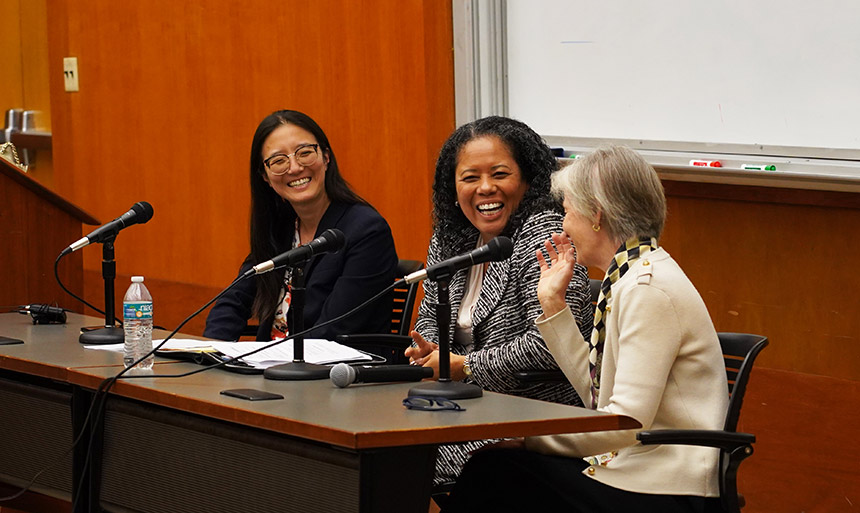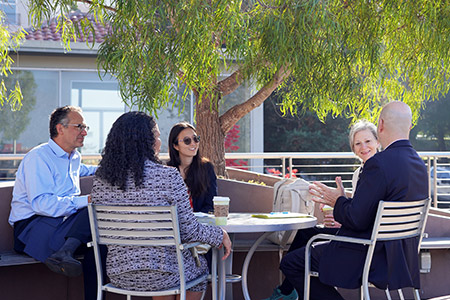
By Andrew Cohen
The diversity of their own paths to the bench reflects the diversity of experience Judges Morgan Christen and Angel Kelley hope to see among clerks and jurists nationwide.
During Berkeley Law’s 10th annual Judges-in-Residence program, they met with students and faculty in varied settings over two packed days — discussing everything from what qualities they look for in clerkship applicants to how to find helpful mentors.
“Diversity is very important to me,” said Kelley, a federal district court judge in Massachusetts, regarding her clerks. “I don’t want a mini-me and I don’t want an echo chamber. I want people who bring different life experiences and diversity can mean any number of things — race, gender, geography, socio-economic, work experience, all of it.”
Kelley became a state district court judge in 2009, moved up to the superior court in 2013, and was installed as a federal judge in 2021. She is just the second Black female judge and the second Asian American judge to serve on the federal district court in Massachusetts.
Christen, a judge on the U.S. Court of Appeals for the Ninth Circuit in Anchorage, spent 14 years as a civil litigator before she was encouraged to apply for a judgeship. She started on the state superior court in 2002, moved to the Alaska Supreme Court seven years later, and was appointed to the federal bench in 2011.
Amid growing polarization in the United States, both judges emphasized the value of ensuring unbiased legal analysis — and hiring clerks who leave their ideology outside chambers.
“The mission for courts is to get the law right,” Christen said. “Politics need to stay out of our decisions, which is even more important now during these politically charged times. I sign off on decisions every week that I don’t necessarily like, but that’s the law and I have to enforce it.”
Busy slate
The judges met with Berkeley Law’s Clerkship Committee, toured the school, visited upper-level and 1L classes, held open office hours for students, talked with Berkeley Law Opportunity Scholars, and took part in lunchtime panels moderated by Director of Judicial Clerkships Anna Han.
Kelley also met with students from Berkeley’s Law Students of African Descent, Asian Pacific American Law Students Association, and Women of Color Collective, and Christen with students participating in the Berkeley Law Alternative Service Trip to Alaska this spring. Both also talked with Dean Erwin Chemerinsky and attended dinners with students, alumni, and faculty.

“Judges Kelley and Christen provided unparalleled insights into the operations of their courts and the clerkship experience,” said 3L Alex MacLennan, who will clerk for Delaware Supreme Court Justice Karen L. Valihura after graduating. “I expect their advice will prove invaluable in maximizing my potential as a judicial law clerk.”
A first-generation college and graduate student, Kelley worked at the Legal Aid Society’s Juvenile Rights Division in Brooklyn, the Port Authority of New York and New Jersey, and as a federal prosecutor before joining the bench. She described learning on the fly during law school while juggling her course load with working two jobs.
“I didn’t know about the value of finding mentors or about opportunities to ask for guidance,” Kelley said. “It’s important for law students to learn about available resources and make use of them. If I had that guidance sooner, it would have helped a lot. Ask more questions, attend more events, and immerse yourself in groups doing work you’re interested in.”
A judicial clerk after graduating from law school, Christen worked for 15 years at Preston Gates & Ellis before her appointment to the Alaska Superior Court. Though she was just 39 when joining the bench and hadn’t planned to consider a judgeship until much later, she heeded the advice of her husband — who encouraged her to consider the opportunity when it presented itself.
“I loved my clerkship and thought that working in chambers was fascinating,” she said. “I loved getting to the right answer without having to advocate. I so admired the judge I clerked for, and didn’t think I could ever perform at his level. One thing I say when I talk to law students is to have big dreams and go for it. But it is important not to miss an opportunity that comes along, even if it’s one you weren’t expecting.”
Doing the homework
Both judges urged prospective clerks to fully understand the clerkships they plan to pursue, noting how the work of appellate courts contrasts sharply from that of trial courts. They also explained the huge spectrum in culture from one judicial chambers to another, with some judges wanting close interactions and others preferring more distance.
“I’m in constant communication with my clerks,” Christen said. “I want to instill camaraderie because our work is very collaborative. Given our very large caseload — in a typical week I might have 30 cases — that’s especially important.”
As for qualities the judges look for in clerkship applicants, each emphasized work ethic, an open mind, efficiency, and writing skills.
“I want people who are willing to put in the work to help me get it right,” Kelley said. “I’m looking for someone who can rise to the challenge. I’ve seen brilliant writers but they just can’t keep up with the pace, and that’s a problem on the trial court level. But you also don’t want the opposite, people who move things along but their work is off track.”
For students aspiring to become a judge one day, Kelley and Christen urged remembering the human element that comes with the position. Noting that “people don’t go to courthouses because they’re having a good day,” and that litigation is exceptionally stressful for litigants and lawyers alike, Christen said basic kindness goes a long way. Kelley agreed.
“When I had to appear in court [as a litigant once], I went to the wrong courthouse and had to race over to the right one,” she said. “That showed me how litigants and lawyers are people, that we all make honest mistakes. I have a deputy who thinks I should come down hard on people who are late or miss a court date, but when that happens I say no, I’ve been there.”